Wicked
A Musical Biography
Paul R. Laird

The Scarecrow Press, Inc.
Lanham Toronto Plymouth, UK
2011
Published by Scarecrow Press, Inc.
A wholly owned subsidiary of The Rowman & Littlefield Publishing Group, Inc.
4501 Forbes Boulevard, Suite 200, Lanham, Maryland 20706
http://www.scarecrowpress.com
Estover Road, Plymouth PL6 7PY, United Kingdom
Copyright 2011 by Paul R. Laird
All rights reserved . No part of this book may be reproduced in any form or by any electronic or mechanical means, including information storage and retrieval systems, without written permission from the publisher, except by a reviewer who may quote passages in a review.
British Library Cataloguing in Publication Information Available
Library of Congress Cataloging-in-Publication Data
Laird, Paul R.
Wicked : a musical biography / Paul R. Laird.
p. cm.
Includes bibliographical references and index.
ISBN 978-0-8108-7751-1 (cloth : alk. paper) ISBN 978-0-8108-7752-8 (ebook)
1. Schwartz, Stephen. Wicked. 2. MusicalsHistory and criticism. I. Title.
ML410.S42L38 2011
792.6 ' 42dc22 2011000510
 The paper used in this publication meets the minimum requirements of American
The paper used in this publication meets the minimum requirements of American
National Standard for Information SciencesPermanence of Paper for Printed Library
Materials, ANSI/NISO Z39.48-1992.
Printed in the United States of America
Printing of musical examples from Wicked and quotation of lyrics from the show has been made possible by the following license:
Wicked
Music and Lyrics by Stephen Schwartz
Copyright Greydog Music
This arrangement 2010 Greydog Music
All Rights Reserved; Used by Permission
Reprinted by permission of Hal Leonard Corporation
Stephen Schwartzs correspondence and personal documents have been quoted with the permission of the composer.
Preface
My route to a book on Wicked was largely determined by a fortuitous meeting with a generous composer and by a delightful confluence of interests with my daughter, Caitlin, who at this writing is age 16. My first meeting with composer and lyricist Stephen Schwartz was at a conference on Leonard Bernsteins Mass sponsored by the Columbus (Ohio) Pro Musica Chamber Orchestra in May 2004. We were both members of a panel on the works creation, with Schwartz recalling his role in writing the English lyrics and assisting with the dramatic structure. Schwartz proved a willing interview subject, leading to two articles and finally to a planned book on his musical theater works, which will hopefully be nearly written by the time this volume is in print. (This larger study of all of Schwartzs works will also appear from Scarecrow Press.) Multiple interviews with Schwartz in the winter of 2008 led to excellent access to primary sources that turned what would have been a single chapter on Wicked into this book. I am most grateful to Stephen Schwartz for allowing me the opportunity to study multiple drafts of scripts, the piano/vocal score and drafts of songs, musical materials deleted from the show, some correspondence, and the orchestral full score prepared for the original cast recording. The composer/lyricist graciously allowed this access, and it was greatly facilitated by his assistant Michael Cole, who has kindly sent many files to me, answered numerous e-mails (often within minutes or hours), and helped me speak to or correspond with other important figures in Wicked s development. Stephen Schwartz has been very generous with his time in several interviews for this book (and numerous others concerning his other shows), in answering e-mail messages, and in offering useful advice on whom else I should contact. When I began to work on the larger study, Schwartz told me he could not offer any primary materials because he had not yet organized his manuscript legacy, but as I continued to visit his office, he helped make available more materials. Remarkably, I had one afternoon where I was able to go through a few boxes of Wicked materials and find what I might need, and then I was allowed to make copies of items that required further study. It is my hope that the book that has resulted will do justice to these opportunities and explain the creation, music, and orchestration of Wicked in a way that others will find useful.
I first saw Wicked on Broadway in March 2005, just before my first face-to-face interview with Schwartz. My knowledge of the show at that point was limited to what I had learned from some reviews, from careful listening to the original cast recording, and from reading Gregory Maguires novel Wicked , which is the source for the show. The audience that night included its share of young women who were enthralled from the opening downbeat, squealing with delight at their favorite moments and sometimes producing a collective, ear-splitting roar. I enjoyed the show and learned many useful details of its creation from Schwartz that night in his New York apartment (which became part of my article on the shows creation in the second edition of The Cambridge Companion to the Musical ), but my initial impressions were influenced deeply by those enraptured young women, making me question just how much Wicked might have to say to adults. My feelings started to change as I did further research, but what really encouraged me to delve deeply into the musical were conversations with my daughter, Caitlin, who is simply fascinated by Wicked . I wanted to understand why Wicked had such a profound effect on Caitlin and her peers. She told me that it was the depiction of Elphaba and Glinda, who seemed so alive in Winnie Holzmans script and Schwartzs songs that Caitlin described them as people that I know. My desire to comprehend the shows appeal to young females necessitated that I see it multiple times, and I discovered real substance based on believable human emotions in characters that grow and change. I also learned that Schwartzs score serves the drama in ways that one appreciates in the most effective musical plays. That these qualities emerge in a show based on the most popular American literary fantasy provides yet another hook that draws in audiences. This process, initiated by discussions with Caitlin, helped plant in me the strong desire to study thoroughly all of the primary sources that I had acquired and to report in a detailed manner on Wicked s creation.
Acknowledgments
There are numerous others to thank for their assistance with aspects of this book. Rene Camus, formerly of Scarecrow Press, showed great enthusiasm for a project on Schwartzs musical theater and helped arrange this separate volume on Wicked . I had several useful conversations with her about Schwartzs shows, and she played a role in shaping both books. After her departure from Scarecrow, Stephen Ryan became my helpful editor. An interview with Wicked s book writer Winnie Holzman in 2005 set me on the right path in understanding the script and provided numerous useful insights. Stephen Oremus, the shows music supervisor, granted two telephone interviews and answered numerous e-mail queries, allowing me an open window into the collaboration process. William David Brohn, the orchestrator, participated enthusiastically in a joint interview with Schwartz in New York City and also answered a few e-mail queries. A telephone interview with Herb Braha concerning Godspell helped clarify an aspect of Schwartzs early working methods. Carol de Giere, author of Defying Gravity: The Creative Career of Stephen Schwartz from Godspell to Wicked (Applause Theatre & Cinema Books, 2008) has been a friendly colleague, passing on useful advice and sharing her great enthusiasm for Schwartzs works. My work in this volume would not have been possible without her extensive research, and there are areas that I have approached in less detail in this book because of what is available in hers. I am grateful to several of my fellow musical theater scholars for counsel and helpful words as I worked on this book and made presentations involving the material at regional meetings of the American Musicological Society and College Music Society, and at the 2010 Association of Theatre in Higher Education in August 2010 in Los Angeles, the conference Song, Stage & Screen 5 in September 2010 at the University of Winchester (UK), and the conference Classic Broadway and Those Who Built It hosted at the University of Colorado at Boulder in October 2010. I would especially like to thank William Everett, George Ferencz, Jane Ferencz, Thomas Riis, Jessica Sternfeld, Scott Warfield, and Stacy Wolf for some helpful conversations and input. George Ferencz also shared his materials and experiences with me concerning his freelance work on arranging the Vocal Selections of Wicked for Hal Leonard, which allowed an interesting addition to chapter 5. Jonas Westover and Doug Reside graciously assisted me with the acquisition of some materials. I am also grateful to Scott Murphy, a music theory professor and treasured colleague at the University of Kansas, who assisted me with some questions concerning a recurring chord in Schwartzs score. Dr. Karin Pagel-Meiners kindly answered some questions concerning German translations. I am thankful to a number of my colleagues at the University of Kansas for the support and interest they have shown in my project. I would like to express my appreciation to the staffs at the New York Public Library for the Performing Arts (especially of the Billy Rose Theatre Division), the British Library, and the Victoria & Albert Theatre Collection, which I consulted in its temporary quarters at the imposing Blythe House near the Kensington (Olympia) Underground station. My research in New York City in the winter of 2008 and my research trip to London in July 2008 were funded by two generous grants from the University of Kansas General Research Fund. Beneficent funding from James P. Zakoura through the Zakoura Family Foundation (a fund of the Greater Kansas City Community Fund-ZFF) and Reach Out Kansas Inc. paid for copyright permissions for the musical examples and quotation of lyrics. Arranging the license for those musical examples was made possible by the helpful cooperation of Charmaine Ferenczi of Schreck Rose Dapello Adams & Hurwitz LLP and Jonathan Belott of Hal Leonard Inc. I appreciated my brother Doug Lairds willingness to travel to what for him is nearby New York City to take the photographs of the Gershwin Theatre and Wicked advertising that appear in this book.

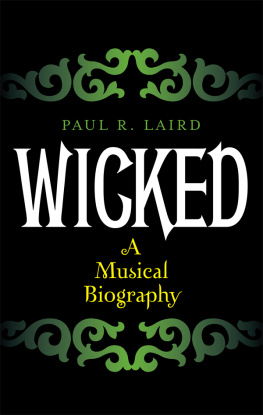

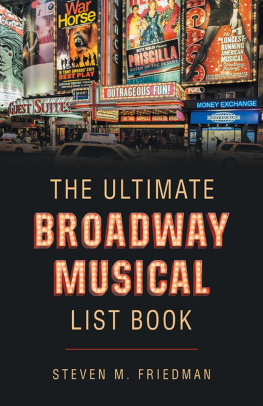
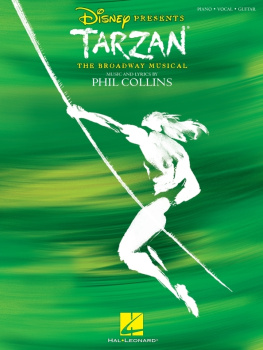
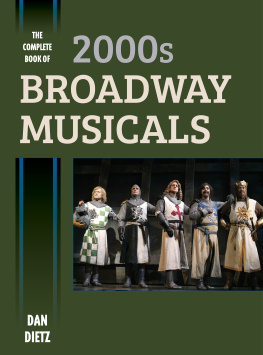
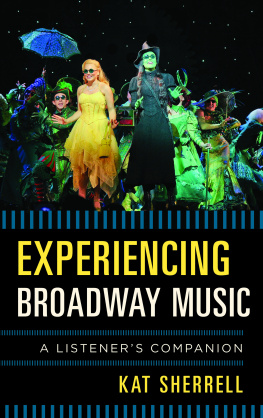

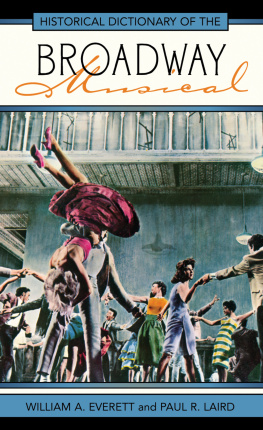
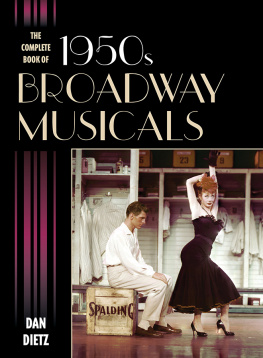
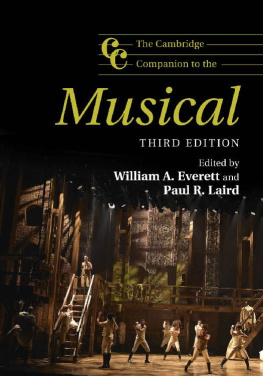
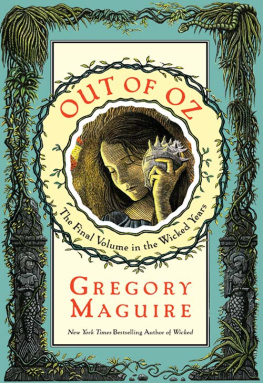
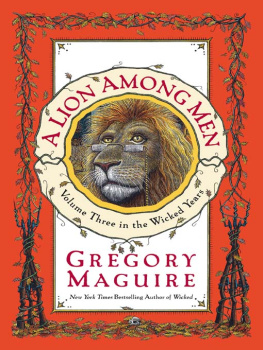

 The paper used in this publication meets the minimum requirements of American
The paper used in this publication meets the minimum requirements of American